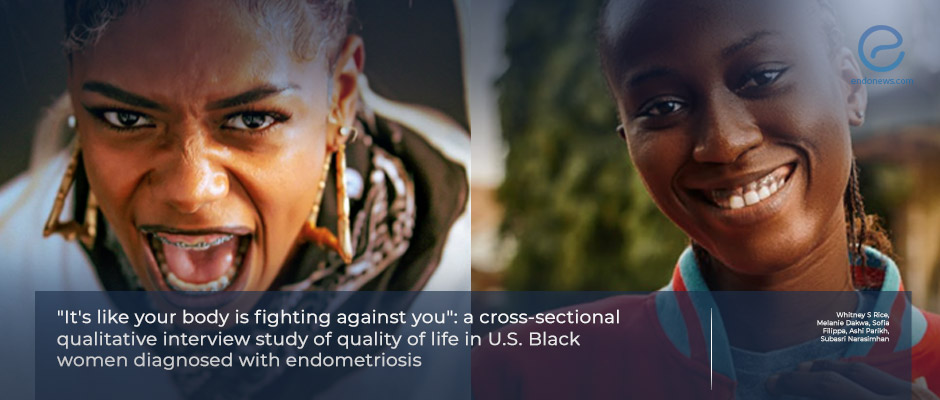Body in Battle: Black Women’s Endometriosis Experience
Oct 10, 2025
Black Women Face Pain, Delays, and Dismissal in Endometriosis Care — Yet Continue to Fight Back
Key Points
Highlights:
- Black women living with endometriosis experience persistent diagnostic delays, under-recognition, and dismissal of pain by healthcare providers.
- The disease significantly affects physical, emotional, social, and occupational well-being, often leading to feelings of isolation and mistrust in the medical system.
- Despite these challenges, participants demonstrated remarkable resilience, community reliance, and self-advocacy in managing their condition.
- There is an urgent need for culturally responsive, equitable, and inclusive approaches to endometriosis diagnosis and care.
Importance:
- This study brings visibility to the experiences of Black women, a group historically underrepresented in endometriosis research.
- Understanding how structural and racial factors shape symptom recognition, diagnostic pathways, and quality of life is vital for addressing disparities in women’s health and developing inclusive clinical guidelines and education.
Whats Done Here?
- This is a qualitative thematic analysis using in-depth interviews with Black women diagnosed with endometriosis.
- Explored the impact of the disease on daily functioning, emotional health, and relationships, and participants’ perspectives on medical care.
- Examined how race, gender, and systemic bias intersect to influence diagnosis, treatment, and patient trust.
Key Results:
- Most participants described long diagnostic journeys, often spanning several years and involving repeated dismissal of symptoms.
- Pain and fatigue disrupted work, family, and social life, contributing to decreased quality of life and emotional exhaustion.
- Feelings of marginalization, stigma, and disbelief by healthcare professionals were common.
- Despite these barriers, women adopted self-education, peer support, and advocacy strategies to reclaim control over their health.
- Participants emphasized that representation, validation, and awareness are critical to improving care for women of color.
Limitations:
- Small sample size limits generalizability, though rich qualitative data provide valuable insights; findings are based on self-reported experiences, which may be subject to recall or response bias; the study reflects the U.S. context, and experiences may differ in other healthcare systems.
From the Editor-in-Chief – EndoNews
"This study powerfully articulates the intersection between race, gender, and chronic pain in endometriosis—a disease that continues to challenge diagnostic and therapeutic equity worldwide. By centering the lived experiences of Black women, the authors expose how systemic biases in healthcare can delay diagnosis, erode trust, and compound suffering. These narratives are not isolated anecdotes but indicators of structural disparities that demand accountability from both clinicians and policymakers.
Beyond its sociological value, this work advances the scientific conversation by reframing endometriosis as not only a gynecologic disease but also a public health and justice issue. Recognition, representation, and research inclusion are critical steps toward breaking diagnostic inertia. The resilience and self-advocacy shown by participants remind us that empowerment must be met with institutional change.
The lesson is clear: progress in endometriosis care cannot be measured solely by advances in surgery or imaging but by equity in diagnosis, empathy in care, and inclusion in research."
Lay Summary
Black women with endometriosis often face more than physical pain — they encounter years of disbelief, dismissal, and delay before receiving a diagnosis.
A new qualitative study published in BMC Women’s Health and led by Dr. Gbemisola D. Rowland explores this reality through the words and lived experiences of Black women in the United States.
The researchers interviewed participants about their journeys with endometriosis, focusing on how the disease affects their daily functioning, emotional well-being, and trust in the healthcare system.
What emerged was a consistent story: women’s pain was frequently minimized or misunderstood, leading to prolonged diagnostic delays and worsening symptoms.
Many described being told their pain was “normal,” or that they were exaggerating — experiences that left lasting psychological scars.
Despite these obstacles, the women in this study demonstrated remarkable resilience and self-advocacy. They educated themselves, built support networks, and developed personal strategies to manage pain and navigate care. Yet, even with these strengths, many continued to feel unseen and unsupported by the medical establishment.
The authors highlight that race, gender, and healthcare bias intersect to deepen diagnostic inequities.
They call for broader inclusion of Black women in endometriosis research, as well as better training for clinicians to recognize and validate diverse symptom presentations.
Endometriosis is not a disease that discriminates, but healthcare systems may do. This study serves as a call to action: to ensure that every woman — regardless of race — is believed, diagnosed promptly, and treated with empathy and respect.
Research Source: https://pubmed.ncbi.nlm.nih.gov/40841635/
researxch delay pain inequities healthcare race

